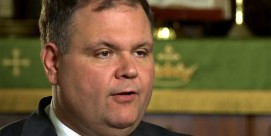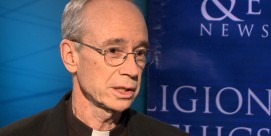David P. Gushee: God and Country with a Mormon Twist
Governor Romney and his staff clearly knew they were dealing with the major issue that stands between him and the Republican nomination. This speech shows all the signs of careful craftsmanship. As written, it is a powerful address.
It must be remembered that Romney’s current task is to win the Republican nomination, not the general election. He knows the electorate that awaits him in the primaries, with its disproportionately powerful bloc of conservative evangelical Christians. He needed to appeal to this group, many of whom believe that Mormonism is a kind of cult.
Read in this way, most of the speech offers material that could have been delivered by any socially conservative Christian preacher, activist, or politician. These standard themes include the following:
– Religion was central to the founders of our nation.
– Religious and moral values impose limits on the behavior of sinful people and thus protect our civilization and preserve liberty.
– The American way of life requires a robustly religious people.
–While we must institutionally separate church and state, we must not remove religious symbols from the public square or deny our religious heritage.
– God is the Creator and Jesus Christ is the Son of God and Savior of humanity.
– Religious beliefs motivate movements of conscience in America.
– Religion is not merely a private affair.
But Governor Romney struck other notes that reflect his particular experiences as a member of a minority religious community in America:
– Linking himself to John F. Kennedy, Romney argued that no person should be elected or denied election to the presidency due to his faith.
– In another allusion to Kennedy, Romney flatly ruled out any influence of church authorities on presidential decisions if he is elected.
– In a creative move that attempted to draw a connection to Abraham Lincoln, Romney argued that America’s “political religion” requires a president to place his obligations to the rule of the law and the Constitution above any other moral or religious duty.
– Romney refused to disavow or distance himself from his Mormon (a word he used only once) faith and indicated that to do so would be to deny his own beliefs and the “faith of my fathers” — an allusion to the old hymn, perhaps?
– The governor emphasized religious liberty and toleration in a stronger way than one often finds on the conservative evangelical right; he lamented that our ancestors too often forgot the value of religious liberty once they had gained their own freedoms; and in naming exiled victims of religious intolerance he included Brigham Young.
– Romney refused to be drawn into a point-by-point defense of Mormon doctrine on the basis that this would enable violation of the “religious test” clause of the Constitution.
How shall we hear and interpret this speech?
If I were an atheist or secularist, I would not find that this speech included me in its circle of who counts as a constructive American citizen. If, as Governor Romney said, “Freedom requires religion and religion requires freedom,” then atheists or secularists by definition undermine freedom, the most cherished American value.
If I were Hindu, Buddhist, or Confucian, or a member of any other non-western religious tradition, I would feel invisible, because such faiths were invisible in the speech.
If I were Muslim, I would appreciate mildly the weak affirmation of our tradition’s “frequent prayer,” but would probably be not at all happy about the various attacks on “radical Islamists,” a staple of so many speeches on the right these days.
If I were Jewish, I would take little comfort in the brief mention of our “ancient traditions…unchanged through the ages,” because Judaism is an evolving contemporary religion and not just an ancient tradition.
As a centrist evangelical, I accept some but not all of the basic Christian right boilerplate that Romney articulated in his speech. I appreciate the religious liberty notes that his own experience as a religious minority caused him to emphasize. I agree that no president should be elected or rejected because of his faith and that no official church body can be allowed to dictate a policy position to a president.
On the other hand, as one who believes that Jesus Christ is Lord of my life and of the whole world, I cannot accept that election to the highest office in the land somehow creates a religious transition in which one’s faith commitments get trumped by the demands of the office. Surely it cannot be as simple as that. “You shall have no other gods before me” is a pretty non-negotiable religious command.
Instead, I want to know how any presidential candidate who claims to be a religious believer translates that faith commitment into moral convictions and then, by extension, brings such convictions to bear on policy positions.
Romney essentially granted this point when he claimed that Americans have a common core of moral convictions that flow from our various faiths and even from our founding documents. He summarized this core as “the conviction of the inherent and inalienable worth of every life.”
For me, personally, this conviction is exactly right. I want to hear how Governor Romney squares that conviction with every policy position he takes, including, for example, his stance on waterboarding, on taxes, on health care, on climate, and on immigration. As an evangelical who cares about such issues, I want a president who is able to see the connections between his policies and the tenderhearted compassion embodied in a human dignity ethic.
We don’t need a “political religion” that trumps religious faith. We need a religious faith that humanely informs our laws and our policies.
David P. Gushee is Distinguished University Professor of Christian Ethics at Mercer University and president of Evangelicals for Human Rights. His most recent book, THE FUTURE OF FAITH IN AMERICAN POLITICS: THE PUBLIC WITNESS OF THE EVANGELICAL CENTER, will be published in January by Baylor University Press.







